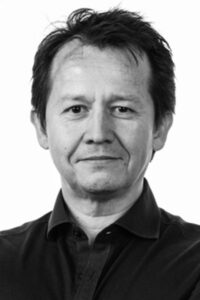Plenary showcases researchers sharing innovative ways to engage the immune system to fight cancer

The Wednesday, April 14, plenary will highlight the importance of the immune system in fighting cancer through the work of four researchers.
“Leveraging the Immune System in the War on Cancer” will take place from 10:45 a.m. – 12:45 p.m. EDT. Registered attendees can watch the session anytime from shortly after the plenary ends through June 21, 2021.
Sergio Quezada, PhD, professor of cancer immunology and immunotherapy at University College London Cancer Institute, will talk about his lab’s ongoing work with CD25, the high-affinity receptor for interleukin-2 during “Targeting regulatory T cells in cancer: From mechanisms to new therapies.” Several years ago, CD25 was exploding as a research topic in the search for full immune activation and tumor rejection. But clinical trial data led many to abandon CD25 for other potential targets.
“There was something amiss in that conclusion. There was something we had missed,” Quezada said. “So we did a lot of mechanistic understanding of the activities that have been evaluated in mouse models of cancer, and we found a piece of data that others had not seen and carried on to understand why we had failed before.”

Quezada will talk about how his lab designed the second generation of anti-CD25 antibody that has demonstrated efficacy at killing the regulatory T cells in a specific manner and activating anti-tumor immunity.
Michel Sadelain, MD, PhD, Memorial Sloan Kettering Cancer Center, will discuss his ongoing work with chimeric antigen receptors (CARs) during “On the road to synthetic immunity: Novel CAR designs.” In the past decade, the field has grown from a few trials to over 700 taking place today. And researchers continue to create new CAR T cells that can detect lower levels of disease while also extending the functional lifespan of the CAR T cells, two main obstacles in CAR design and development.
Sadelain’s presentation will focus on two novel CAR T cell designs based on gene editing, 1XX and HIT receptors. This will be the first time Sadelain will present on the HIT receptor, which has been designed to seek out tumor cells possessing the target antigen at low levels.

“The HIT receptor is a novel device designed to prevent tumor escape caused by low level antigen expression,” Sadelain said. “1XX, on the other hand, has the ability to elicit powerful anti-tumor properties without compromising the durability of CAR T cells. 1XX CAR T cells have already entered the clinic in hematological and solid cancers. We are going to bring the HIT receptor to the clinic, but it will take another year.”
During “Twists and turns in translation of CD137 (4-1BB)-based cancer immunotherapy,” Ignacio Melero. MD, PhD, University of Navarra, Pamplona, Spain, will share the story of possible treatment strategies based on this CD137 T lymphocyte receptor. Melero will discuss the mechanisms behind CD137 immunotherapy by reviewing proof-of-concept going back to 1997 up to the first clinical experiences with agonists directed to CD137 that caused liver inflammation and delaying disease progression. He also will reference some unpublished results from clinical trials using tumor-targeted CD137 agonists for efficacy and liver safety,
Melero noted that there are five agents in first in-human trials, with another six agents or more coming soon.

“The concept is that CD137 can be stimulated to intensify antitumor immune response with great efficacy in preclinical models especially when combined with multiple other agents,” Melero said.
Anjana Rao, PhD, La Jolla Institute for Immunology, will present “Transcriptional networks in tumor-infiltrating T cells.” Rao’s research focuses on the regulation of gene expression, using immune cells, hematopoietic stem cells and embryonic stem cells as model systems. Her lab’s recent work incudes defining the role of NFAT and other transcription factors in anti-tumor responses and exploring the roles of TET proteins and oxidized methylcytosines in the immune/ hematopoietic systems and in embryonic development and oncogenesis.
[gap]
